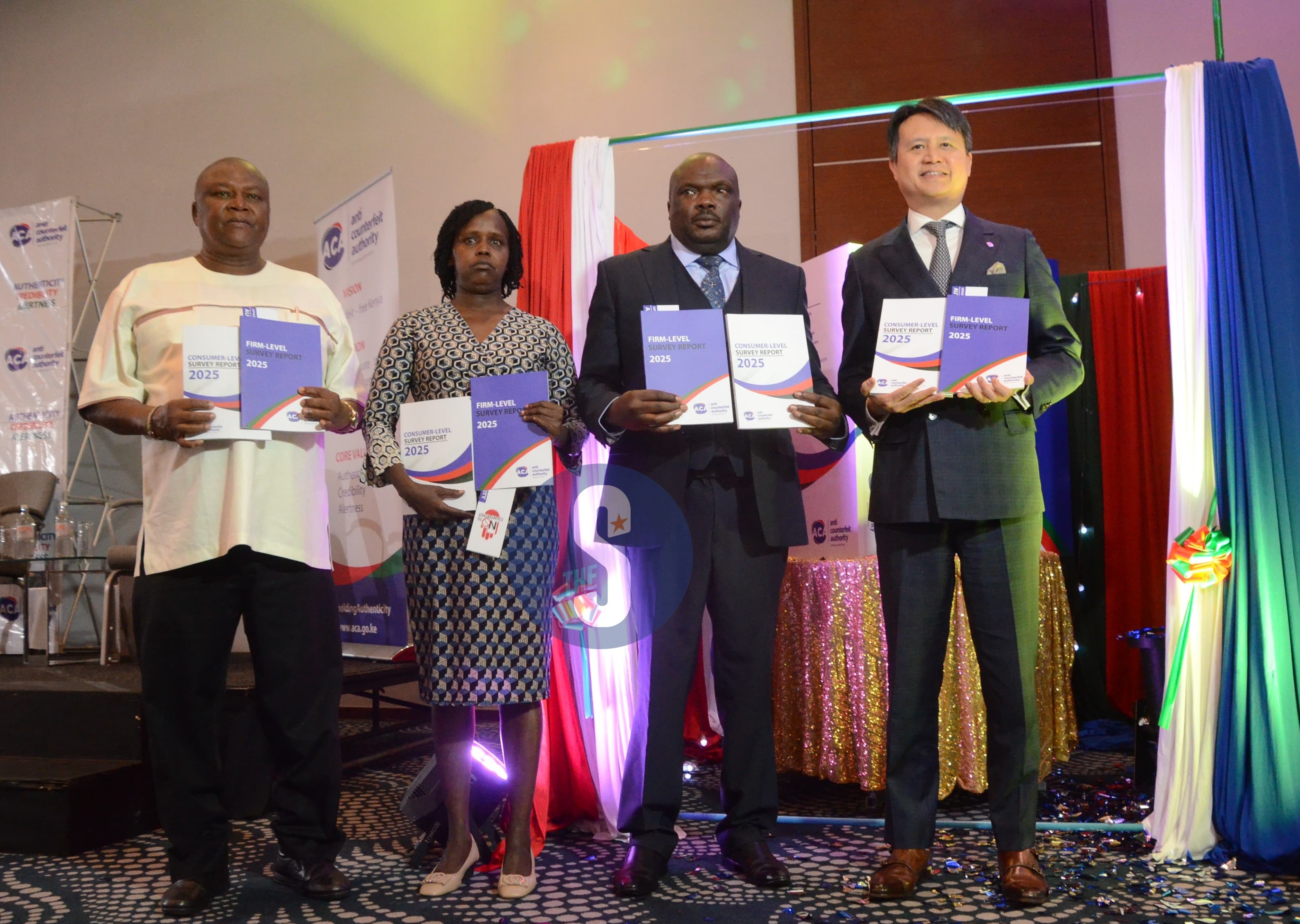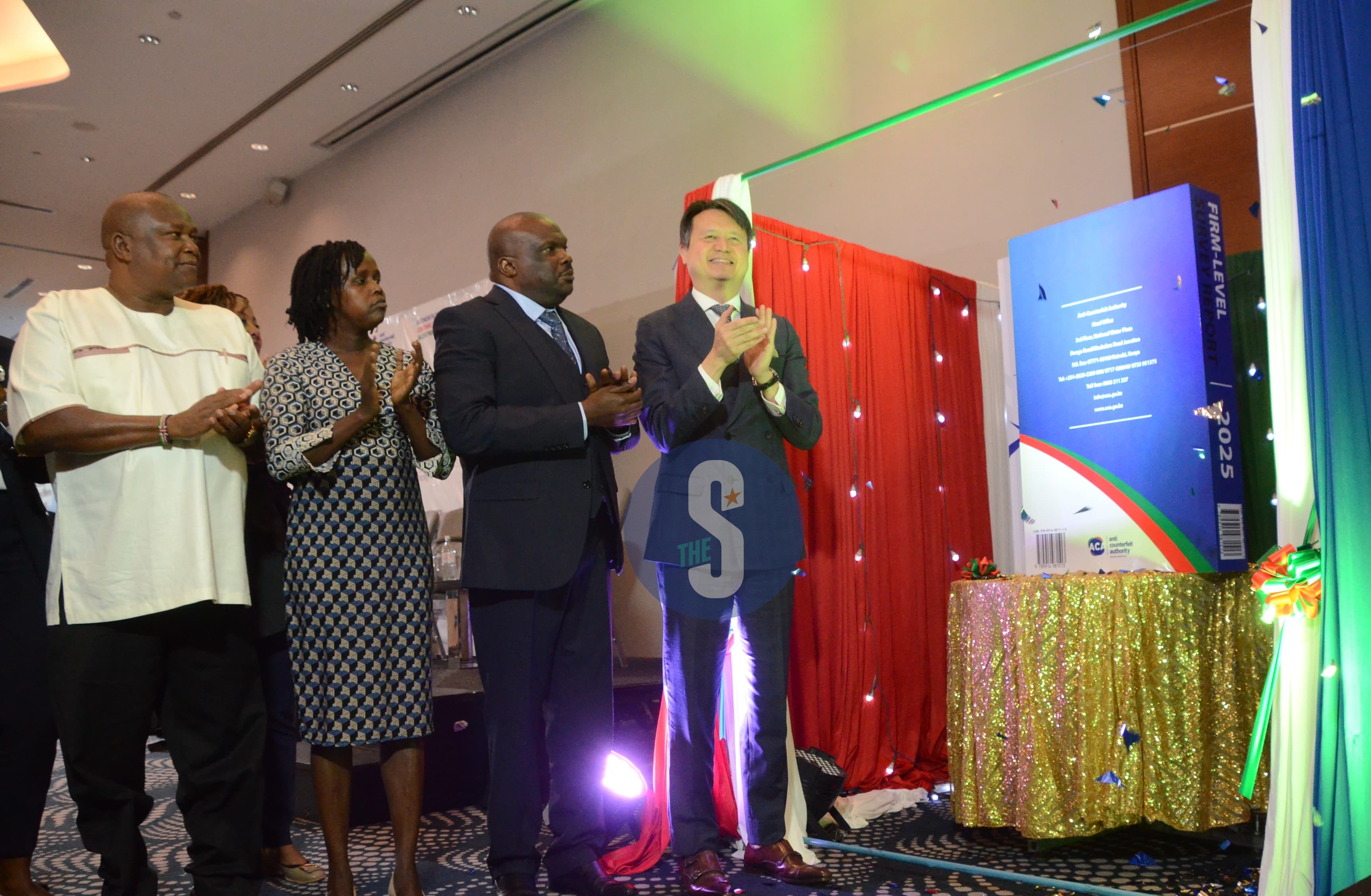 Joseph Mbeva director of industries MITI, ACA board member Neddy Kiptoo, executive director Dr Robi Njoroge and World Intellectual Property Organization director general Daren Tang displaying a report in celebration of World Anti-conterfeit Day at Radisson Blu hotel, June 6, 2025. /DOUGLAS OKIDDY
Joseph Mbeva director of industries MITI, ACA board member Neddy Kiptoo, executive director Dr Robi Njoroge and World Intellectual Property Organization director general Daren Tang displaying a report in celebration of World Anti-conterfeit Day at Radisson Blu hotel, June 6, 2025. /DOUGLAS OKIDDY
The Anti-Counterfeit Authority (ACA), in collaboration with the Ministry of Investments, Trade and Industry (MITI) and the World Intellectual Property Organization (WIPO), marked World Anti-Counterfeit Day with an international symposium aimed at strengthening the fight against fake goods.
World Anti-Counterfeit Day is observed globally to raise awareness about the dangers of counterfeit goods and to mobilise action against illicit trade.
Held under the banner of global cooperation, the event brought together policymakers, academics, and private sector stakeholders to address the persistent challenge of counterfeit trade, which continues to pose a serious threat to Kenya's economy, public health, and industrial development.
"Counterfeiting is a major economic and public health threat, costing Kenya an estimated Sh153 billion annually across key sectors including health, agriculture, construction and electronics," said Robi Njoroge, executive director of ACA.
Speaking on Friday at the Radison Blu hotel in Nairobi, he described counterfeiting not only as theft but also as a public health crisis, a barrier to industrial growth, and a serious threat to investor confidence.
In Kenya, ACA plays a leading role in coordinating awareness campaigns, engaging stakeholders, and launching strategic reports and action plans aimed at tackling the scourge of counterfeit products.
"The event has brought us together to address the growing threat of counterfeit goods and promote stronger collaboration in intellectual property protection," said Peter Kariuki, lead researcher at KCA University.
"More so, spotlight the far-reaching impacts of counterfeit goods on the economy, public health and consumer safety."
Kariuki pointed out that consumer behaviour plays a key role in fuelling counterfeit trade.
He observed that the demand for cheap alternatives often encourages the proliferation of substandard and fake goods.
 Joseph Mbeva director of industries MITI, ACA board member Neddy Kiptoo, executive director Dr Robi Njoroge and World Intellectual Property Organization director general Daren Tang launch a report in celebration of World Anticonterfait Day at Radisson Blu hotel, June 6, 2025. /DOUGLAS OKIDDY
Joseph Mbeva director of industries MITI, ACA board member Neddy Kiptoo, executive director Dr Robi Njoroge and World Intellectual Property Organization director general Daren Tang launch a report in celebration of World Anticonterfait Day at Radisson Blu hotel, June 6, 2025. /DOUGLAS OKIDDYIn a move aimed at streamlining operations and improving service delivery, Robi announced the merger of the ACA, the Kenya Industrial Property Institute (KIPI), and the Kenya Copyright Board (KECOBO) into a single entity—the Kenya Intellectual Property Authority (KIPA).
The new agency will consolidate functions related to intellectual property registration, enforcement, and protection, helping to eliminate duplication and make IP services more accessible.
Robi also raised concern over the growing circulation of counterfeit medicines in the market, warning of the long-term risks to consumers.
"We are facing a situation where generations could be impacted by ineffective or harmful products sold as medicine," he said.
He called for collective global action, citing Kenya’s ongoing partnerships with organisations such as the European Union, WIPO, the World Customs Organization (WCO), Interpol, and countries across the Lusophone, Anglophone, and Francophone regions.
“This is a Kairos moment—the right time for bold action to secure Kenya’s future in innovation and IP protection,” Robi stated.
Kariuki echoed the need for vigilance, stating that awareness is critical in protecting consumers from unknowingly purchasing unsafe, illegal, or substandard products.
“Counterfeit activities erode the value of intellectual property, discourage innovation, and undermine creative industries,” he added.
He further urged the public and policymakers to tighten security around e-commerce platforms and digital marketplaces, where counterfeit goods increasingly find their way to consumers.
As the world marks World Anti-Counterfeit Day, Kenya’s call for coordinated action sends a strong message: the time to act is now—not only to protect economic growth but to safeguard public health and ensure a thriving environment for innovation.
















